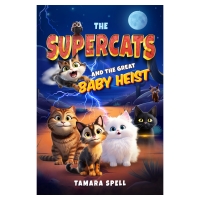Frequently Asked Questions
Were the supercats based on real cats? What was the inspiration for the book?
Yes, the supercats in my book were based on five real cats, adopted either by me or by members of my family. The personalities of the feline characters are true to their real-life counterparts.
Cats (and many other pets) have such unique personalities, quirks, and habits. Watching these pets interact with each other is so endearing and was a large part of what inspired me to create these characters and write this story. I hope my book honors these amazing real-life kitties and the companionship, smiles, and joy they have brought to myself and my family.
Can you give me advice about my cat or other pets?
No. Although I am a veterinarian, my book is a work of fiction. Any writing or other information from me is for general information and/or entertainment purposes only.
Please note that questions about individual pets will not receive a response.
I can’t provide specific medical advice for several reasons, the first of which is legal. This includes considerations such as state/local license requirements (I'm only licensed where I live), virtual care or telehealth laws (which vary significantly by location), and the legal need to establish a valid veterinary-patient-client-relationship (which in many locations requires an in-person physical examination). Keep in mind that these laws are designed to protect our wonderful pets by providing them with the best possible care from qualified medical professional.
Finally, while a career in veterinary medicine can be very meaningful, it also demands a lot. Busy days can be not only physically and mentally taxing, but difficult days can also weigh heavy on my heart and soul. When I’m at work, I give my best. Outside of work, I find it’s important to maintain boundaries so I can recharge and give my best self to my own family and loved ones.
It’s best to establish a relationship with a local veterinarian or veterinary practice over time, so that they can get to know your pet and their unique medical history and individual needs. And for urgent and emergency care, research your local area so you know where to take your furkid should you ever need to, especially after hours. Your pet's regular veterinarian likely has a recommendation for where to go in a pet emergency.Where can I learn more about cats?
If you have any questions about your individual pet(s), especially concerning any medical issues or symptoms, please talk to your veterinarian (or head to an urgent care or emergency veterinarian if needed).
With that in mind, here are some resources that I’ve found to be helpful to many pet owners:
- Veterinary Partner (a veterinary source for general pet health and care information, as well as information on many pet medical conditions)
- OSU Indoor Pet Initiative (information and resources to help keep indoor cats happy and healthy, from The Ohio State University College of Veterinary Medicine)
- The ASPCA's list of plants that are toxic or non-toxic to pets
- Association for Pet Obesity Prevention (how to tell if your kitty is a healthy weight, feeding and lifestyle recommendations, and other information)
- Fear Free Pets (information on how to keep cats behaviorally enriched and happy, as well as some information on anxiety conditions)
- The Kitten Lady (helpful info if you're caring for an abandoned or ophaned kitten)
- Pet Poison Helpline
I’m interested in writing a book. How do I get started?
Luckily, nowadays, with so much information available online, there are a multitude of ways to learn about and get started writing, whether you’re interested in fiction, non-fiction, graphic novels, or even blogs, screenwriting, etc.
Here are some of the resources I personally have found helpful . . .
- YouTube: It's a go-to resource for so many things now. And that includes writing and publishing. Just search for the topic in which you are interested, i.e., children's book writing, traditional publishing versus self-publishing, etc. There are many out there that I've watched and found helpful, but to get you started, here are two of my favorite channels, with generous authors who share a ton of wisdom and information online:
- For traditional book writing and publishing (via a literary agent and traditional publishing house): Alexa Donne
- For self-publishing, writing tips, and planning/scheduling tips to keep you on track: Sarra Cannon/Heart Breathings
- SCBWI (Society of Children's Book Writers and Illustrators) for children's books
- Local writing groups (a good starting point is to search meetup.com)
- Writing conferences (local and online)
- Books I recommend
- The Writer's Journey, by Cristopher Vogler
- The War of Art, by Steven Pressfield
- Writing the Breakout Novel, by Donald Maass
- On Writing, by Stephen King
- And many more . . . I'll try to keep adding to this list
- Alliance of Independent Authors (ALLi) especially for those interested in self-publishing, marketing, etc.
- BookBaby, a service I used to help with the publishing, formating, and distribution process for my book.
- Genre specific writing groups such as the Science Fiction and Fantasy Writers Association (SFWA), Romance Writers of America (RWA), etc.
- Masterclass.com, which has classes on a variety of topics including book and story writing
- Read a lot in the genre in which you plan to publish, to see what is successful and to get an innate feel for story structure and character development. I believe physical books, digital books, and audiobooks all count as reading. However, there is some benefit to seeing words on the page if you are able to, to help get a sense for grammatical structure when you write your own story.
- Practice! It's possible to learn and learn and learn forever, and there are many wonderful teachers and resources out there. But the best way to integrate all that valuable information is to keep practicing your own story writing, incorporating what you learn along the way.
There are many quality programs out there to help a person learn to write. But as with anything in life, if it sounds too good to be true, it probably is. And as with any other product or service, I recommend thoroughly researching before making any large purchases from anybody (for coaching programs, publishing packages, etc.). Make sure you trust the person/service and that it's what you really want and need.
Many authors also start with free programs and gradually work up to paid programs, conferences, and services later on. Also, don’t forget about the fact that you can borrow books on writing from your local library (I love their free audiobook options that I can download right on my phone via library apps like Libby and Hoopla). Starting with free resources is a great choice, since there are so many out there (YouTube has also been a huge resource for me).
To which animal welfare charities do you donate?
I donate at least 10% of net proceeds from sale of my books to animal-related charities. I do this once the donation amount reaches at least $100.
Charities may be local (such as the local branch of the Humane Society in my city) larger non-profits, or even animal rescue/rehab or veterinary organizations abroad. I choose the organizations at my discretion, although I am always open to learning about other great causes that could use help. I'll try to post an update on my website or social media as donations occur.

